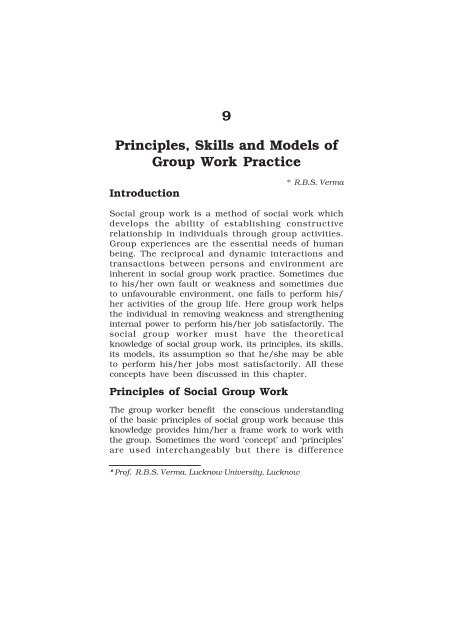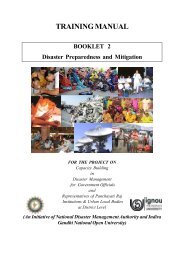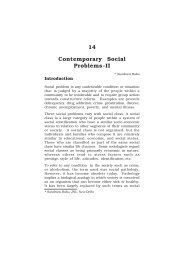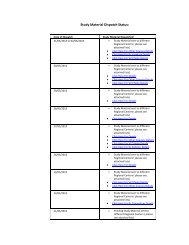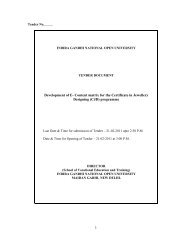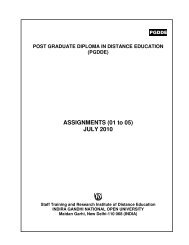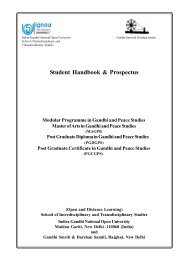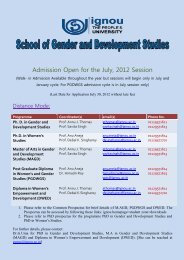Principles, Skills and Models of Group Work Practice - IGNOU
Principles, Skills and Models of Group Work Practice - IGNOU
Principles, Skills and Models of Group Work Practice - IGNOU
You also want an ePaper? Increase the reach of your titles
YUMPU automatically turns print PDFs into web optimized ePapers that Google loves.
212 Social <strong>Work</strong> Intervention with Individuals <strong>and</strong> <strong>Group</strong>s<br />
9<br />
<strong>Principles</strong>, <strong>Skills</strong> <strong>and</strong> <strong>Models</strong> <strong>of</strong><br />
<strong>Group</strong> <strong>Work</strong> <strong>Practice</strong><br />
Introduction<br />
* R.B.S. Verma<br />
Social group work is a method <strong>of</strong> social work which<br />
develops the ability <strong>of</strong> establishing constructive<br />
relationship in individuals through group activities.<br />
<strong>Group</strong> experiences are the essential needs <strong>of</strong> human<br />
being. The reciprocal <strong>and</strong> dynamic interactions <strong>and</strong><br />
transactions between persons <strong>and</strong> environment are<br />
inherent in social group work practice. Sometimes due<br />
to his/her own fault or weakness <strong>and</strong> sometimes due<br />
to unfavourable environment, one fails to perform his/<br />
her activities <strong>of</strong> the group life. Here group work helps<br />
the individual in removing weakness <strong>and</strong> strengthening<br />
internal power to perform his/her job satisfactorily. The<br />
social group worker must have the theoretical<br />
knowledge <strong>of</strong> social group work, its principles, its skills,<br />
its models, its assumption so that he/she may be able<br />
to perform his/her jobs most satisfactorily. All these<br />
concepts have been discussed in this chapter.<br />
<strong>Principles</strong> <strong>of</strong> Social <strong>Group</strong> <strong>Work</strong><br />
The group worker benefit the conscious underst<strong>and</strong>ing<br />
<strong>of</strong> the basic principles <strong>of</strong> social group work because this<br />
knowledge provides him/her a frame work to work with<br />
the group. Sometimes the word ‘concept’ <strong>and</strong> ‘principles’<br />
are used interchangeably but there is difference<br />
* Pr<strong>of</strong>. R.B.S. Verma, Lucknow University, Lucknow
<strong>Principles</strong>, <strong>Skills</strong> <strong>and</strong> <strong>Models</strong> <strong>of</strong> <strong>Group</strong> <strong>Work</strong> <strong>Practice</strong> 213<br />
between the two. The concepts are ideas regarding<br />
individuals, groups <strong>and</strong> communities emerged from<br />
social <strong>and</strong> biological sciences as well as from the<br />
humanities disciplines. Such concepts are for example<br />
social distance, problem, role, ego, etc. They are basic<br />
to all social work methods. A principle is a verbalized<br />
statement, general rules or laws, fundamental truths<br />
by which we proceed from one situation to another. A<br />
principle must be understood to mean a hypothesis so<br />
adequately tested by observation <strong>and</strong> experiment that<br />
it may be put forward as a guide to action. Social group<br />
work principles are guiding assertions <strong>of</strong> statements<br />
that have come from experience <strong>and</strong> research. Basic<br />
principles <strong>of</strong> working with people in groups to help them<br />
grow <strong>and</strong> change have emerged from the practice <strong>of</strong><br />
social group work. The objectives <strong>of</strong> social group work<br />
can be fulfilled only within the frame work <strong>of</strong> principles.<br />
Therefore, it seems necessary to deal with basic<br />
principles, which are guiding force for group work<br />
practice. Douglas has described fourteen principles <strong>of</strong><br />
social group work.<br />
1) Recognition <strong>and</strong> subsequent action in relation to<br />
the unique difference <strong>of</strong> each individual.<br />
2) Recognition <strong>and</strong> subsequent action in relation to<br />
the wide variety <strong>of</strong> groups as groups.<br />
3) Genuine acceptance <strong>of</strong> each individual with his<br />
unique strengths <strong>and</strong> weaknesses.<br />
4) Establishment <strong>of</strong> a purposeful relationship between<br />
group worker <strong>and</strong> group members.<br />
5) Encouragement <strong>and</strong> enabling <strong>of</strong> help <strong>and</strong> cooperative<br />
relationship between members.<br />
6) Appropriate modification <strong>of</strong> the group process.
214 Social <strong>Work</strong> Intervention with Individuals <strong>and</strong> <strong>Group</strong>s<br />
7) Encouragement <strong>of</strong> each member to participate<br />
according to the stage <strong>of</strong> his capacity <strong>and</strong> enabling<br />
him to become more capable.<br />
8) Enabling members to involve themselves in the<br />
process <strong>of</strong> problem solving.<br />
9) Enabling group members to experience increasingly<br />
satisfactory forms <strong>of</strong> working through conflicts.<br />
10) Provision <strong>of</strong> opportunities for new <strong>and</strong> differing<br />
experience in relationships <strong>and</strong> accomplishments.<br />
11) Judicious use <strong>of</strong> limitations related to the diagnostic<br />
assessment <strong>of</strong> each individual <strong>and</strong> total situation.<br />
12) Purposeful <strong>and</strong> differential use <strong>of</strong> programme<br />
according to diagnostic evaluation <strong>of</strong> individual<br />
members group purpose <strong>and</strong> appropriate social<br />
goals.<br />
13) Ongoing evaluation <strong>of</strong> individual <strong>and</strong> group progress.<br />
14) Humane <strong>and</strong> disciplined use <strong>of</strong> self on the part <strong>of</strong><br />
the group worker.<br />
Konopka has described certain principles to work with<br />
the groups. Summary <strong>of</strong> these principles has been<br />
narrated here.<br />
1) The social worker’s goal is to enable clients or group<br />
members as a whole to move toward greater<br />
independence <strong>and</strong> capacity for help.<br />
2) The social worker must use the scientific method<br />
to prepare for action fact-finding analysis <strong>and</strong><br />
diagnosis in relation to the individual, group <strong>and</strong><br />
the social environment.<br />
3) The social worker must form purposeful relationship.<br />
It means a conscious focusing on the needs <strong>of</strong> the<br />
group members <strong>and</strong> attempts to fulfill them.
<strong>Principles</strong>, <strong>Skills</strong> <strong>and</strong> <strong>Models</strong> <strong>of</strong> <strong>Group</strong> <strong>Work</strong> <strong>Practice</strong> 215<br />
4) The social worker must use himself consciously.<br />
This includes self-knowledge <strong>and</strong> discipline in<br />
relationship but without the loss <strong>of</strong> warmth <strong>and</strong><br />
spontaneity.<br />
5) The social worker must accept members as they<br />
are, without condemning their behaviour. This<br />
involves deep underst<strong>and</strong>ing <strong>of</strong> group members as<br />
well as knowledge <strong>and</strong> identification <strong>of</strong> values<br />
regulating human beings.<br />
6) The social worker must underst<strong>and</strong> the origins <strong>of</strong><br />
his own value system <strong>and</strong> be able to h<strong>and</strong>le it in<br />
relation to the value system <strong>of</strong> others.<br />
7) He must allow members to develop their own<br />
behaviour without much interference <strong>and</strong> to choose<br />
their own point <strong>of</strong> departure without imposing<br />
outside dem<strong>and</strong>s. But the worker has responsibility<br />
for stimulating change.<br />
Cohen has also discussed certain principles which may<br />
be significant in working with the groups. According to<br />
him:<br />
1) The group members must be encouraged to help<br />
themselves by the social worker playing as indirect<br />
or enabling role rather than a manipulative one. It<br />
means the group members be given the right <strong>of</strong><br />
self-direction <strong>and</strong> self-determination.<br />
2) The work with the group should be started at the<br />
level <strong>of</strong> group members. It means that proper<br />
knowledge <strong>of</strong> educational, economic, social <strong>and</strong><br />
other characteristics are essential while working<br />
with the group. If the work or programmes are above<br />
the mental level <strong>of</strong> members, they will loose their<br />
interest.
216 Social <strong>Work</strong> Intervention with Individuals <strong>and</strong> <strong>Group</strong>s<br />
3) Social worker must focus not merely on the<br />
immediate problem as seen by the group but on<br />
relation to the total situation.<br />
4) Social worker must keep in mind that individual<br />
differences exist while dealing with the group<br />
members.<br />
5) It should be kept in mind that the welfare <strong>of</strong><br />
individual is inextricably interwoven with the<br />
welfare <strong>of</strong> the group. Therefore social worker must<br />
be concerned with the development <strong>of</strong> material,<br />
human <strong>and</strong> social resources to meet all the needs<br />
<strong>of</strong> all the members <strong>of</strong> the group.<br />
Friedl<strong>and</strong>er has mentioned the following basic<br />
principles <strong>of</strong> social group work.<br />
1) The function <strong>of</strong> the social group worker is a helping<br />
or enabling one. This means that his goal is to help<br />
the members <strong>of</strong> the group <strong>and</strong> the group as a whole<br />
to move toward greater independence <strong>and</strong> capacity<br />
for self-help.<br />
2) In determining his/her way <strong>of</strong> life, the group worker<br />
uses the scientific method--- fact-finding, analysis<br />
<strong>and</strong> diagnosis in relation to the individual, the group<br />
<strong>of</strong> the social environment.<br />
3) The group work method requires the worker to form<br />
purposeful relationship to group members <strong>and</strong> the<br />
group.<br />
4) One <strong>of</strong> the main tools in achieving such relationship<br />
is the conscious use <strong>of</strong> self.<br />
5) A basic respect <strong>and</strong> love for people without<br />
considering his weakness.<br />
6) The work should be started from where the group<br />
is.
<strong>Principles</strong>, <strong>Skills</strong> <strong>and</strong> <strong>Models</strong> <strong>of</strong> <strong>Group</strong> <strong>Work</strong> <strong>Practice</strong> 217<br />
7) There should be constructive use <strong>of</strong> limitations. The<br />
group worker will mainly use himself, programme<br />
materials, interaction <strong>of</strong> the group <strong>and</strong> awaking <strong>of</strong><br />
insight in the group members.<br />
8) Every member <strong>of</strong> the group should be understood<br />
separately. It means individualization is essential.<br />
9) Interaction is a process through which group<br />
members develop their strengths <strong>and</strong> power.<br />
Therefore, social group worker should properly<br />
monitor this process.<br />
10) It is also necessary that non-verbal activities <strong>and</strong><br />
programmes should be understood <strong>and</strong> used<br />
alongwith the verbal material.<br />
Trecker has explained the following principles <strong>of</strong> social<br />
group work.<br />
1) The principle <strong>of</strong> planned group formation.<br />
2) The principle <strong>of</strong> specific objectives.<br />
3) The principle <strong>of</strong> purposeful worker-group<br />
relationship.<br />
4) The principle <strong>of</strong> continuous individualization.<br />
5) The principle <strong>of</strong> guided group interaction.<br />
6) The principle <strong>of</strong> democratic group selfdetermination.<br />
7) The principle <strong>of</strong> flexible functional organisation.<br />
8) The principle <strong>of</strong> progressive programme experience.<br />
9) The principle <strong>of</strong> resource utilization.<br />
10) The principle <strong>of</strong> evaluation.
218 Social <strong>Work</strong> Intervention with Individuals <strong>and</strong> <strong>Group</strong>s<br />
On the basis <strong>of</strong> different principles discussed by different<br />
social work authors, we may summarize as follows.<br />
1) Principle <strong>of</strong> planned organisation <strong>of</strong> the group.<br />
2) Principle <strong>of</strong> underst<strong>and</strong>ing each individual as a<br />
member <strong>of</strong> a group <strong>and</strong> as an individual.<br />
3) Principle <strong>of</strong> equality.<br />
4) Principle <strong>of</strong> underst<strong>and</strong>ing relationship as tool for<br />
solving group problems as well as individual<br />
problems <strong>and</strong> also for development <strong>of</strong> the group.<br />
5) Principle <strong>of</strong> encouragement <strong>of</strong> each member <strong>of</strong> the<br />
group.<br />
6) Principle <strong>of</strong> recognition <strong>of</strong> variety <strong>of</strong> groups with<br />
different objectives.<br />
7) Principle <strong>of</strong> self-development, i.e. full opportunity<br />
to the group to organise it programmes according to<br />
its needs.<br />
8) Principle <strong>of</strong> self problem solving. Members should<br />
be involved in understating <strong>and</strong> solving problems<br />
themselves.<br />
9) Principle <strong>of</strong> use <strong>of</strong> programme according to diagnosis<br />
<strong>of</strong> the group. Different types <strong>of</strong> programmes are<br />
needed according to the problems <strong>of</strong> the group.<br />
10) Principle <strong>of</strong> experience development. Each member<br />
<strong>of</strong> the group should get opportunity to act <strong>and</strong> express<br />
his feelings in the group.<br />
11) Principle <strong>of</strong> underst<strong>and</strong>ing the importance <strong>of</strong> group<br />
life in shaping <strong>and</strong> moulding one’s character <strong>and</strong><br />
personality. The group worker should believe the<br />
importance <strong>of</strong> group experience.
<strong>Principles</strong>, <strong>Skills</strong> <strong>and</strong> <strong>Models</strong> <strong>of</strong> <strong>Group</strong> <strong>Work</strong> <strong>Practice</strong> 219<br />
12) Principle <strong>of</strong> underst<strong>and</strong>ing the group process <strong>and</strong><br />
its different elements, for example, group structure,<br />
role <strong>and</strong> status, division <strong>of</strong> responsibility, etc.<br />
13) Principle <strong>of</strong> underst<strong>and</strong>ing familiarity with the<br />
process <strong>of</strong> cooperation, conflict, accommodation,<br />
resistance <strong>and</strong> ambivalence in the group. This<br />
knowledge is essential to h<strong>and</strong>le the different group<br />
situation.<br />
14) Principle <strong>of</strong> modification in-group process. The group<br />
worker always keeps in mind the result <strong>of</strong> group<br />
activities. If it is not as it is required he suggests<br />
the group members to modify their activities <strong>and</strong><br />
programmes.<br />
15) Principle <strong>of</strong> providing new opportunities. It is the<br />
job <strong>of</strong> group worker to make aware the group about<br />
the opportunities <strong>of</strong> work in different fields <strong>and</strong> also<br />
the ways <strong>and</strong> means to avail these opportunities.<br />
16) Principle <strong>of</strong> use <strong>of</strong> constructive limitations. Nobody<br />
is perfect. This is also applicable to the group<br />
members. Whatever the capacity <strong>and</strong> ability they<br />
have should be used properly by the group <strong>and</strong><br />
whatever the limitations, they should fully<br />
underst<strong>and</strong> <strong>and</strong> attempts should be made to work<br />
within these limitations.<br />
17) Principle <strong>of</strong> conscious use <strong>of</strong> himself/herself. The<br />
role <strong>of</strong> group worker is to guide the interaction<br />
process <strong>of</strong> the group. He/She should interfere in<br />
the group activities only when group members<br />
should dem<strong>and</strong> for his/her help. Members <strong>of</strong> the<br />
group should not feel that the worker is<br />
unnecessary interferes in their affairs.<br />
18) Principle <strong>of</strong> use <strong>of</strong> scientific action plan. It means<br />
that the social group worker first find out the
220 Social <strong>Work</strong> Intervention with Individuals <strong>and</strong> <strong>Group</strong>s<br />
problem <strong>of</strong> the group or collect data <strong>and</strong> on the basis<br />
<strong>of</strong> collected facts, the diagnosis is done. After that<br />
action plan should be prepared for the solution <strong>of</strong><br />
the problem <strong>and</strong> for the development <strong>of</strong> the group.<br />
19) Principle <strong>of</strong> acceptance. It means that the group<br />
worker should accept the members as they are<br />
without condemning any weakness. At group level,<br />
it must accept the services <strong>of</strong> the group worker.<br />
20) Principle <strong>of</strong> underst<strong>and</strong>ing values. Values are the<br />
guiding force for behaviour expression, they must<br />
be kept in mind while dealing with the group<br />
problems.<br />
21) Principle <strong>of</strong> determination <strong>of</strong> specific objectives.<br />
Objectives should be clear for the group as well as<br />
to the group worker.<br />
22) Principle <strong>of</strong> resource utilization. The group may have<br />
different kind <strong>of</strong> needs <strong>and</strong> these needs cannot be<br />
fulfilled by one agency <strong>and</strong> therefore the worker<br />
should tap the resources <strong>of</strong> the community.<br />
23) Principle <strong>of</strong> evaluation, continuous examination <strong>and</strong><br />
evaluation <strong>of</strong> group activities.<br />
Program Planning in Social <strong>Group</strong> <strong>Work</strong><br />
Program Planning in Social <strong>Group</strong> <strong>Work</strong> ----Trecker<br />
In the group work, if a program has to be <strong>of</strong> maximum<br />
value,<br />
1) it must be person centered<br />
2) it must meet specific needs<br />
3) it should develop out <strong>of</strong> the interest <strong>and</strong> needs <strong>of</strong><br />
the group members
<strong>Principles</strong>, <strong>Skills</strong> <strong>and</strong> <strong>Models</strong> <strong>of</strong> <strong>Group</strong> <strong>Work</strong> <strong>Practice</strong> 221<br />
4) it should involve the members themselves in<br />
planning to the maximum amount <strong>of</strong> their ability<br />
5) it should utilize the worker as a helping person.<br />
The worker is not there to give a program, but to<br />
help the members to develop their own program.<br />
The term program is a concept which when broadly<br />
conceived includes the entire range <strong>of</strong> activities,<br />
relationships, interactions <strong>and</strong> experiences <strong>of</strong> individual<br />
members <strong>and</strong> the group which have been deliberately<br />
planned <strong>and</strong> carried out with the help <strong>of</strong> the worker to<br />
meet the needs <strong>of</strong> the individuals <strong>and</strong> the group. The<br />
worker helps the group to select the areas <strong>of</strong> content<br />
<strong>and</strong> the media <strong>of</strong> expression. The group worker who<br />
consciously relates the ‘what’ (the content) <strong>of</strong> program<br />
<strong>and</strong> the ‘how’ (the means) <strong>of</strong> program with the ‘why’<br />
(aims <strong>and</strong> objectives) <strong>of</strong> program. The program<br />
development process aims at the blossoming <strong>of</strong> the<br />
group’s own potentialities.<br />
The social worker’s primary job in program development<br />
is to guide the process <strong>of</strong> interaction among the group<br />
members. Social group work utilizes the interaction <strong>of</strong><br />
members around program in an agency setting with<br />
worker guidance. Interaction refers to participating<br />
beahviour <strong>of</strong> a reciprocal kind. Interaction itself is not<br />
an end but rather a means to the goal <strong>of</strong> the group.<br />
<strong>Principles</strong> <strong>of</strong> Program Planning<br />
1) Program should grow out <strong>of</strong> the needs <strong>and</strong> interests<br />
<strong>of</strong> the individuals who compose the group.<br />
2) Program should take into account the factors such<br />
as age <strong>of</strong> the members, cultural background <strong>and</strong><br />
economic condition.
222 Social <strong>Work</strong> Intervention with Individuals <strong>and</strong> <strong>Group</strong>s<br />
3) Program should provide individuals with experience<br />
<strong>and</strong> opportunities, which they voluntarily choose to<br />
pursue because <strong>of</strong> their interest <strong>and</strong> values.<br />
4) Program should be flexible <strong>and</strong> varied to satisfy a<br />
variety <strong>of</strong> needs <strong>and</strong> interests <strong>and</strong> to afford a<br />
maximum number <strong>of</strong> opportunities for participation.<br />
5) Program should evolve from the simple to the more<br />
complex, with movement coming as a result <strong>of</strong> group<br />
growth in ability <strong>and</strong> readiness, movement from<br />
initially ‘personal’ to ‘social’ or ‘community’ concerns<br />
should be an ultimate objective if our program is to<br />
have greater social significance.<br />
<strong>Skills</strong> <strong>of</strong> Social <strong>Group</strong> <strong>Work</strong><br />
In a general sense skill means the capacity to perform<br />
activities. The Webster Dictionary defines it as<br />
“knowledge <strong>of</strong> <strong>and</strong> expertness in execution <strong>and</strong><br />
performance”. Virginia Robinson refers to skill as “the<br />
capacity to set in motion <strong>and</strong> control a process <strong>of</strong> change<br />
in specific material in such a way that the change that<br />
takes place in the material is affected with the greatest<br />
degree <strong>of</strong> consideration for <strong>and</strong> utilization <strong>of</strong> the quality<br />
<strong>and</strong> capacity <strong>of</strong> the material”. Trecker defines methods<br />
<strong>and</strong> skill as “Methods means the purposeful use <strong>of</strong><br />
insights <strong>and</strong> underst<strong>and</strong>ing based upon a body <strong>of</strong><br />
knowledge <strong>and</strong> principles. Skill is the capacity to apply<br />
knowledge <strong>and</strong> underst<strong>and</strong>ing to a given situation.<br />
Jekins has listed certain skills that are essential for a<br />
social group worker to become more productive in-group<br />
situation.<br />
1) Exchanging ideas among the members freely <strong>and</strong><br />
clearly, using language understood by everyone <strong>and</strong><br />
with no fears <strong>of</strong> starting arguments or hurting<br />
feelings.
<strong>Principles</strong>, <strong>Skills</strong> <strong>and</strong> <strong>Models</strong> <strong>of</strong> <strong>Group</strong> <strong>Work</strong> <strong>Practice</strong> 223<br />
2) Examining objectively how well the group <strong>and</strong> its<br />
members are working.<br />
3) Sharing the leadership jobs among the group<br />
members <strong>and</strong> show sensitivity to the feelings <strong>of</strong> all.<br />
4) Accepting new ideas <strong>and</strong> new members into the<br />
group without irreparable conflict, <strong>and</strong> to<br />
disciplining the group to work toward long range<br />
objectives <strong>and</strong> pr<strong>of</strong>it from failures.<br />
5) Thinking clearly about group problems, findings,<br />
causes <strong>and</strong> working for solutions.<br />
6) Adjusting group procedures <strong>and</strong> plans to meet the<br />
feelings <strong>and</strong> the desires <strong>of</strong> the members.<br />
7) Creating new jobs or committees as needed <strong>and</strong> to<br />
terminate them or the group itself, when the need<br />
is fulfill.<br />
Phillips has enumerated the following skills <strong>of</strong> social<br />
group work.<br />
I) Skill in Using Agency Functions<br />
The group worker must be skillful in carrying the<br />
functions <strong>of</strong> agency. He should always try to<br />
propagate what the agency in the community wants<br />
to do. He does the following activities for this.<br />
1) The Intake Process<br />
The worker who meets the applicants while<br />
carrying out the agency’s procedures for intake,<br />
will discuss with him what him/her particularly<br />
wants from the agency as well as what is<br />
available those for him/her to consider both the<br />
privileges <strong>and</strong> responsibilities <strong>of</strong> agency<br />
membership.
224 Social <strong>Work</strong> Intervention with Individuals <strong>and</strong> <strong>Group</strong>s<br />
2) Connecting the <strong>Group</strong> with the Agency<br />
The worker relates the group more firmly to<br />
the agency by helping it to underst<strong>and</strong> what<br />
the agency st<strong>and</strong>s for <strong>and</strong> what kind <strong>of</strong><br />
responsible behaviour is expected <strong>of</strong> them as<br />
well as <strong>of</strong> other groups.<br />
3) Serving the Individual through the <strong>Group</strong> <strong>Work</strong><br />
Process<br />
Since the function <strong>of</strong> the agency includes<br />
helping group units to develop in socially useful<br />
ways, as well as helping individuals the social<br />
worker’s attention must be on the development<br />
<strong>of</strong> the group as a whole <strong>and</strong> on each individual’s<br />
use <strong>of</strong> the group.<br />
4) <strong>Work</strong>ing with the Individual Outside the<br />
<strong>Group</strong> <strong>of</strong> Meetings<br />
Although the worker <strong>of</strong>fers his services within<br />
the group process he also provides help to the<br />
individual if need be for the better use <strong>of</strong> group<br />
experience on the part <strong>of</strong> member.<br />
5) The Referral Process<br />
An important part <strong>of</strong> the group work agency’s<br />
service is to work with members <strong>and</strong> their<br />
parents in a process <strong>of</strong> considering the use <strong>of</strong><br />
other community services for help with problems<br />
that can not be dealt within the group work<br />
agency.<br />
II)<br />
Skill in Communication <strong>of</strong> Feelings<br />
The social group worker should have the following<br />
skills.
<strong>Principles</strong>, <strong>Skills</strong> <strong>and</strong> <strong>Models</strong> <strong>of</strong> <strong>Group</strong> <strong>Work</strong> <strong>Practice</strong> 225<br />
1) The <strong>Work</strong>er’s Feelings<br />
High among the qualities essential to a social<br />
worker’s skill is the capacity to feel with others.<br />
2) The <strong>Group</strong> Member’s Feelings<br />
The worker must be skillful in helping the group<br />
members to know, accept, express <strong>and</strong> be<br />
responsible for their feelings.<br />
3) <strong>Group</strong> Feelings<br />
The interaction <strong>of</strong> each member with the others<br />
<strong>and</strong> the worker produces group feelings. The<br />
worker helps the group in underst<strong>and</strong>ing their<br />
feelings <strong>and</strong> its meanings.<br />
III) <strong>Skills</strong> in Using the Reality <strong>of</strong> the Present<br />
Under this the social worker does two things.<br />
1) Utilizing the group’s current interest for<br />
purposeful activity.<br />
2) Helping the group to take responsible decision.<br />
IV) Skill in Stimulating <strong>and</strong> Using <strong>Group</strong> Relations<br />
1) The social group worker should enable each<br />
group member to find <strong>and</strong> take his part in<br />
relationship with other members.<br />
2) He should be skillful in using programmes to<br />
strengthen group relations.<br />
Trecker has listed the following basic skills <strong>of</strong> social<br />
group work.<br />
1) Skill in Establishing Purposeful Relationship<br />
a) The group worker must be skilful in gaining the<br />
acceptance <strong>of</strong> the group <strong>and</strong> in relating himself<br />
to the group on a positive pr<strong>of</strong>essional basis.
226 Social <strong>Work</strong> Intervention with Individuals <strong>and</strong> <strong>Group</strong>s<br />
b) The group worker must be skillful in helping<br />
individuals in the group to accept one another<br />
<strong>and</strong> to join with the group in common pursuits.<br />
2) Skill in Analysing the <strong>Group</strong> Situation<br />
a) The worker must be skillful in judging the<br />
developmental level <strong>of</strong> the group to determine<br />
what the level is, what the group needs <strong>and</strong><br />
how quickly the group can be expected to move.<br />
This calls for skill in direct observation <strong>of</strong> groups<br />
on a basis <strong>of</strong> analysis <strong>and</strong> judgement.<br />
b) The group worker must be skillful in helping<br />
the group to express ideas, work out objectives,<br />
clarify immediate goals <strong>and</strong> see both its<br />
potentialities <strong>and</strong> limitations as a group.<br />
3) Skill in Participation with the <strong>Group</strong><br />
a) The group worker must be skillful in<br />
determining, interpreting, assuming <strong>and</strong><br />
modifying his own roles with the group.<br />
b) The group worker must be skillful in helping,<br />
group members to participate, to locate<br />
leadership among themselves <strong>and</strong> to take<br />
responsibility for their own activities.<br />
4) Skill in Dealing with <strong>Group</strong> Feeling<br />
a) The group worker must be skilful in controlling<br />
his own feelings about the group <strong>and</strong> must study<br />
each new situation with a high degree <strong>of</strong><br />
objectivity.<br />
b) The group worker must be skillful in helping<br />
groups to release their own feelings, both<br />
positive <strong>and</strong> negative. He must be skillful in<br />
helping groups to analyze situations as part <strong>of</strong>
<strong>Principles</strong>, <strong>Skills</strong> <strong>and</strong> <strong>Models</strong> <strong>of</strong> <strong>Group</strong> <strong>Work</strong> <strong>Practice</strong> 227<br />
the working through group or intergroup<br />
conflicts.<br />
5) Skill in Programme Development<br />
a) The group worker must be skillful in guiding<br />
group thinking so that interests <strong>and</strong> needs will<br />
be revealed <strong>and</strong> understood.<br />
b) The group worker must be skillful in helping<br />
groups to develop programmes, which they want<br />
as a means through which their needs may be<br />
met.<br />
6) Skill in Using Agency <strong>and</strong> Community Resources<br />
a) The group worker must be skillful in locating<br />
<strong>and</strong> then acquainting the group with various<br />
helpful resources which can be utilized by the<br />
members for programme purpose.<br />
b) The group worker must be skillful in helping<br />
certain individual members to make use <strong>of</strong><br />
specialized services by means <strong>of</strong> referral that<br />
cannot be met within the group.<br />
7) Skill in Evaluation<br />
a) The group worker must have skill in recording<br />
the development processes that are going on<br />
as he works with the group.<br />
b) The group worker must be skillful in using his<br />
records <strong>and</strong> in helping the group to review its<br />
experiences as a means <strong>of</strong> improvement.<br />
On the basis <strong>of</strong> above discussions <strong>and</strong> opinions <strong>of</strong><br />
different social workers on the different types <strong>of</strong> skills<br />
essential for group work practitioners, we may list them<br />
as follows.
228 Social <strong>Work</strong> Intervention with Individuals <strong>and</strong> <strong>Group</strong>s<br />
I) Communication <strong>Skills</strong><br />
Communication is at the heart <strong>of</strong> group work<br />
practice. The social group worker makes use <strong>of</strong> two<br />
broad categories <strong>of</strong> communication skills .<br />
i) Those which are intended to facilitate<br />
interpersonal helping.<br />
ii)<br />
Those intended to facilitate to achieve the group<br />
work objectives.<br />
A number <strong>of</strong> specific skills may help the group worker<br />
to perform his jobs more effectively.<br />
1) Skill <strong>of</strong> Programme Planning<br />
It is very essential that group worker must be<br />
skillful in planning the programmes for the<br />
group. It is also essential that the worker must<br />
be skillful in communicating the message<br />
around the answers <strong>of</strong> several questions. He/<br />
She should be skillful in communicating his<br />
own feelings to the members <strong>of</strong> the group.<br />
2) Skill <strong>of</strong> Identify Self Role<br />
It is an important step in group work practice.<br />
The worker must convince the group for his<br />
interfence in its affairs.<br />
3) Skill <strong>of</strong> Explaining the Purpose <strong>of</strong> the <strong>Group</strong><br />
Formation <strong>and</strong> Communicate the <strong>Group</strong><br />
Everybody before joining the group wants to<br />
know about the benefits <strong>of</strong> joining the group. If<br />
he/she is satisfied, he comes forward <strong>and</strong><br />
become a member <strong>of</strong> that group. Therefore, the<br />
group worker must be skillful in convincing the<br />
people to avail the facilities <strong>of</strong> the agency by
<strong>Principles</strong>, <strong>Skills</strong> <strong>and</strong> <strong>Models</strong> <strong>of</strong> <strong>Group</strong> <strong>Work</strong> <strong>Practice</strong> 229<br />
joining the group. The worker, further, explains<br />
how communicate in group so that the group<br />
may advance in its goal.<br />
4) Skill in Interpreting Verbal Communication<br />
It is the job <strong>of</strong> the group worker to keep watch<br />
on the verbal communication among the group<br />
members because if it is not on the right track,<br />
the group may loose its basic purpose. He/she<br />
should always try to direct in proper direction.<br />
5) Skill <strong>of</strong> Answering Question<br />
During group process, certain questions,<br />
queries or doubts are raised by the group<br />
members. If they are not answered in right<br />
perspective, the members may disassociate<br />
themselves. Therefore, it is essential that the<br />
social group worker has the vide knowledge <strong>of</strong><br />
social work as well as human behaviour.<br />
II)<br />
Skill in Effective Helping Relationship<br />
It is heart <strong>of</strong> social group work practice. A group<br />
worker must genuinely care for the group members.<br />
The relationship will be more cohesive <strong>and</strong> fruitful<br />
if the social group worker possesses the following<br />
skills.<br />
1) Skill <strong>of</strong> Empathy<br />
It refers to the worker’s capacity to perceive<br />
accurately member’s feelings <strong>and</strong> subjective<br />
experiences. The group worker should show in<br />
his/her behaviour that he/she is taking<br />
genuine interest in their welfare. It will help<br />
in developing confidence between group worker<br />
<strong>and</strong> the group.
230 Social <strong>Work</strong> Intervention with Individuals <strong>and</strong> <strong>Group</strong>s<br />
2) Skill <strong>of</strong> Encouraging the Member’s Feedback<br />
It refers to statement that encourages the<br />
member to respond to the worker’s explanation.<br />
This gives the members an opportunity to ask<br />
questions <strong>and</strong> raise disagreement if any.<br />
3) Skill <strong>of</strong> Describing the Member’s Role<br />
This is common tendency that everybody wants<br />
facilities, <strong>and</strong> rights but less inclined to fulfill<br />
their duties. It is the job <strong>of</strong> the social group<br />
worker to explain the member who is joining<br />
the group about his role in the group. When<br />
he/she is clear about his/her role he/she<br />
works happily.<br />
4) Skill <strong>of</strong> Active Listening<br />
In active listening the worker tends to both the<br />
member verbal <strong>and</strong> non-verbal message. The<br />
listening become active listening when it is<br />
followed by clarification <strong>and</strong> explanations<br />
needed by the group members.<br />
5) Skill <strong>of</strong> Exploring the Member’s Silence<br />
Sometimes it happens that one or the other<br />
members <strong>of</strong> the group keeps silence <strong>and</strong> takes<br />
the least interest in the group activities. It is<br />
the job <strong>of</strong> social group worker to find out the<br />
reasons for his/her silence <strong>and</strong> encourage him/<br />
her for active involvement.<br />
6) Skill <strong>of</strong> Recognizing every Member’s<br />
Strengths<br />
It refers to expressions <strong>of</strong> confidence in the<br />
members ability to accomplish some specific<br />
tasks in the group process. It will help the group
<strong>Principles</strong>, <strong>Skills</strong> <strong>and</strong> <strong>Models</strong> <strong>of</strong> <strong>Group</strong> <strong>Work</strong> <strong>Practice</strong> 231<br />
worker in performing different types <strong>of</strong> activities<br />
in the group with the help <strong>of</strong> its members <strong>and</strong><br />
thus the group will grow <strong>and</strong> enrich in achieving<br />
its objectives.<br />
7) Skill in Partialization <strong>and</strong> Gradation <strong>of</strong> the<br />
Problem<br />
All the problems <strong>of</strong> the group <strong>and</strong> its members<br />
cannot be solved at once. Therefore, their<br />
gradation <strong>and</strong> partialization is needed. Priority<br />
should be fixed by the group worker. It will<br />
facilitate the group process in right direction.<br />
Assumptions Underlying Social <strong>Group</strong><br />
<strong>Work</strong><br />
It is accepted that the group attempts to achieve its<br />
goals through the interaction <strong>of</strong> its members. So the<br />
basic assumption is that the group organised for a given<br />
purpose attempts to achieve this purpose by employing<br />
their members to the best possible use. There are many<br />
factors that can influence the interaction <strong>of</strong> the<br />
members <strong>of</strong> a group. These factors maybe liking <strong>of</strong><br />
members <strong>of</strong> each other, availability <strong>of</strong> direction,<br />
resources available, etc. A group in which members<br />
dislike one another tend to perform less effectively their<br />
roles than a group whose members are on friendly terms.<br />
Douglas has drawn up a list <strong>of</strong> the basic assumptions<br />
upon which group work practice is based. These<br />
assumptions are:<br />
1) That group experience is universal <strong>and</strong> an essential<br />
part <strong>of</strong> human existence.<br />
2) That group can be used to effect changes in the<br />
attitudes <strong>and</strong> behaviour <strong>of</strong> individuals.
232 Social <strong>Work</strong> Intervention with Individuals <strong>and</strong> <strong>Group</strong>s<br />
3) That group provides experiences which can be<br />
monitored or selected in some way for beneficial<br />
ends. Life out side the group is in no way neglected,<br />
it tends to be put out <strong>of</strong> focus.<br />
4) That group <strong>of</strong>fers experience shared with others so<br />
that all can come to have something common with<br />
the sense <strong>of</strong> belonging <strong>and</strong> <strong>of</strong> growing together.<br />
5) That groups produce change which is more<br />
permanent than can be achieved by other methods<br />
<strong>and</strong> the change is obtained more quickly also.<br />
6) That groups assist in the removal or diminution <strong>of</strong><br />
difficulties created by previous exposure to the<br />
process <strong>of</strong> learning.<br />
7) That groups as instruments <strong>of</strong> helping others may<br />
be economical in the use <strong>of</strong> scarce resources. e.g.<br />
skilled workers, time etc.<br />
8) That a group can examine its own behaviour <strong>and</strong> in<br />
so doing learn about the general patterns <strong>of</strong> group<br />
behaviour.<br />
In general, social group work is based on the following<br />
basic assumptions.<br />
1) Man is a group animal.<br />
2) Social interaction is the result <strong>of</strong> group life.<br />
3) Man’s achievements can be increased, changed <strong>and</strong><br />
developed through group experiences.<br />
4) The capacity to solve problems may be increased<br />
through group experiences.<br />
5) <strong>Group</strong> experience changes the level <strong>of</strong> individual<br />
aspirations <strong>and</strong> desires.
<strong>Principles</strong>, <strong>Skills</strong> <strong>and</strong> <strong>Models</strong> <strong>of</strong> <strong>Group</strong> <strong>Work</strong> <strong>Practice</strong> 233<br />
6) <strong>Group</strong> recreational activities are beneficial to both<br />
individual <strong>and</strong> society.<br />
7) <strong>Group</strong> experience has permanent impact on<br />
individuals.<br />
8) <strong>Group</strong> work always focus its attention on two types<br />
<strong>of</strong> activities --- programme <strong>and</strong> social relationship in<br />
the group.<br />
9) Pr<strong>of</strong>essional knowledge <strong>and</strong> skills are essential for<br />
working with the group.<br />
10) Knowledge <strong>of</strong> social science is required to deal with<br />
the group.<br />
<strong>Models</strong> <strong>of</strong> Social <strong>Group</strong> <strong>Work</strong><br />
On the basis <strong>of</strong> varied assumptions about the role <strong>of</strong><br />
the worker, the group members <strong>and</strong> the content <strong>of</strong> the<br />
group, social workers proposed four distinct group work<br />
models. These are:<br />
1) Remedial<br />
2) Mediating<br />
3) Developmental <strong>and</strong><br />
4) Social goal model<br />
Remedial Model<br />
Remedial model focuses on the individuals dysfunction<br />
<strong>and</strong> utilizes the group as a context <strong>and</strong> means for<br />
altering deviant behaviour. This approach to group work<br />
practice emphasizes its utility in removing the adverse<br />
conditions <strong>of</strong> individuals whose behaviour is disapproved<br />
by the society. Clients <strong>of</strong> such social group work practice<br />
are physically <strong>and</strong> mentally h<strong>and</strong>icapped, legal<br />
<strong>of</strong>fenders, emotionally disturbed, isolated <strong>and</strong> alienated<br />
persons.
234 Social <strong>Work</strong> Intervention with Individuals <strong>and</strong> <strong>Group</strong>s<br />
The Michigan School contributed to this model. Credit<br />
goes to Vinter <strong>and</strong> his colleagues for developing remedial<br />
model. In this model attempts are being made by social<br />
worker to bring change in the individual. He/she is the<br />
target point.<br />
According to the Remedial Model, the group can be used<br />
to treat problems <strong>of</strong> adjustments in personal <strong>and</strong> social<br />
relations. According to Vinter “attention to such<br />
problems reaffirms the pr<strong>of</strong>ession’s historic mission <strong>of</strong><br />
service to those most in need”. The remedial model is<br />
considered more as a clinical model that seeks to help<br />
the socially maladapted to improve social functioning<br />
through guided group experience.<br />
The social worker plays a key role as he/she gives<br />
expertise knowledge through the following activities.<br />
1) The social worker is the central person.The worker<br />
is the object <strong>of</strong> identification <strong>and</strong> drives.<br />
2) He/she is a symbol <strong>and</strong> a spokesman. He/she tries<br />
to maintain norms <strong>and</strong> values <strong>of</strong> the society.<br />
3) He/she is a motivator <strong>and</strong> stimulator. He/she helps<br />
the individual <strong>and</strong> group to underst<strong>and</strong> their goal<br />
as a group member.<br />
4) He/she is an executive. He/she facilitates the<br />
activities <strong>of</strong> the group in order to gain the said<br />
objectives.<br />
In this model whatever the changes are brought, they<br />
are explicitly limited to organisational <strong>and</strong> institutional<br />
elements that are responsible for individual’s<br />
dysfunction. Though this model focuses mainly on the<br />
individual client who is experiencing difficulty, the<br />
model is helpful for those likely to be affected. It means<br />
this model focuses on preventive aspects also .
<strong>Principles</strong>, <strong>Skills</strong> <strong>and</strong> <strong>Models</strong> <strong>of</strong> <strong>Group</strong> <strong>Work</strong> <strong>Practice</strong> 235<br />
Reciprocal Model or Mediating Model<br />
Schwartz has introduced this model in 1961. This model<br />
is based on open systems theory, humanistic psychology<br />
<strong>and</strong> an existential perspective. The following are the<br />
chief characteristics <strong>of</strong> this model .<br />
1) People <strong>and</strong> society are interdependent because they<br />
have mutual needs. When there is interference with<br />
these mutual strivings, it results into conflict.<br />
2) The resolution <strong>of</strong> this conflict is possible only when<br />
interested parties try to underst<strong>and</strong> their dilemmas<br />
with all <strong>of</strong> these inner resources <strong>and</strong> they utilize<br />
that at that moment.<br />
3) In this model attention is directed towards the<br />
relationship <strong>of</strong> members in the group with each<br />
other, with the worker <strong>and</strong> the group as a whole.<br />
4) It is the relationship among the members that shows<br />
the characteristics <strong>of</strong> the group.<br />
5) In this model emphasis is placed on the continuing<br />
<strong>and</strong> reciprocal transactions <strong>of</strong> sets <strong>of</strong> members with<br />
each other, the worker <strong>and</strong> the group.<br />
6) It gives importance to the emergent goal <strong>and</strong> actions,<br />
which are based on feelings <strong>of</strong> the group. It believes<br />
that intensive involvement by the parties in the<br />
current realities will generate their on purposes<br />
<strong>and</strong> goals.<br />
7) Client <strong>and</strong> worker together as well as separately<br />
challenge the current problems with their total<br />
capacity.<br />
8) Basic educative processes are utilized which<br />
incorporate particularizing, synthesizing <strong>and</strong><br />
generalizing the feeling <strong>and</strong> action components <strong>of</strong><br />
the problem.
236 Social <strong>Work</strong> Intervention with Individuals <strong>and</strong> <strong>Group</strong>s<br />
9) In this model distinctions are not made with respect<br />
to types <strong>and</strong> various <strong>of</strong> group since it is presumed<br />
that this model is widely applicable.<br />
In this model the individual <strong>and</strong> the group are significant<br />
components. The workers role appears to be facilitative,<br />
relying on the power <strong>and</strong> potency <strong>of</strong> mutual aid system<br />
to take care <strong>of</strong> itself.<br />
Developmental Model<br />
This model has been developed by the faculty members<br />
<strong>of</strong> Boston University under the leadership <strong>of</strong> Berustein<br />
in 1965. Lowy is the main architect <strong>of</strong> the developmental<br />
model. In this approach, groups are seen as having “a<br />
degree <strong>of</strong> independence <strong>and</strong> autonomy, but the to <strong>and</strong><br />
fro flow between them <strong>and</strong> their members, between<br />
them <strong>and</strong> their social settings, is crucial to their<br />
existence, viability <strong>and</strong> achievements. The chief<br />
characteristics <strong>of</strong> this model are:<br />
1) It is primarily based on the dynamics <strong>of</strong> intimacy<br />
<strong>and</strong> closeness between the members over a span <strong>of</strong><br />
time.<br />
2) The degree <strong>of</strong> intimacy is taken into account for<br />
appropriate worker interventions.<br />
3) Conceptualization <strong>of</strong> study, diagnosis <strong>and</strong> treatment<br />
is made at all three levels <strong>of</strong> individuals, group <strong>and</strong><br />
the setting.<br />
4) This model derives knowledge from Erikson’s ego<br />
psychology, group dynamics <strong>and</strong> conflict theory.<br />
5) The group worker is engaged in study, diagnosis<br />
<strong>and</strong> treatment.<br />
6) The worker is connected with community, agency,<br />
group <strong>and</strong> individual member.
<strong>Principles</strong>, <strong>Skills</strong> <strong>and</strong> <strong>Models</strong> <strong>of</strong> <strong>Group</strong> <strong>Work</strong> <strong>Practice</strong> 237<br />
7) The group is envisioned as a microcosm <strong>of</strong> society.<br />
8) Thoughts, feelings, sentiments <strong>and</strong> behaviour are<br />
continuously assessed <strong>and</strong> attempts are made to<br />
improve them.<br />
9) The social group worker tries to improve the<br />
situations among individual member, group agency<br />
<strong>and</strong> the social environment.<br />
10) In short, it can be said that the developmental model<br />
is a compromise between the reciprocal, remedial<br />
<strong>and</strong> traditional approaches.<br />
The Social Goals Model<br />
The basic concepts <strong>of</strong> this model are social<br />
consciousness, social responsibility, <strong>and</strong> social change.<br />
It is suggested that by participation with others in a<br />
group situation, individuals can affect social change.<br />
Social action is the desired outcome, <strong>and</strong> the group<br />
worker is regarded as an influence person <strong>and</strong> enabler,<br />
who personifies the values <strong>of</strong> social responsibility <strong>and</strong><br />
acts as stimulator <strong>and</strong> role model without purveying<br />
any political viewpoint. Implicit in this model is the<br />
emerging leader within the group. The model is<br />
concerned with democracy <strong>and</strong> the enhancement <strong>of</strong><br />
personal functioning within the social context,<br />
heightened self-esteem <strong>and</strong> an increase in social power<br />
for the members <strong>of</strong> the group collectively <strong>and</strong> as<br />
individuals. The skill <strong>of</strong> the leader lies mainly in<br />
‘programming’ (Weince 1964) (Konopka 1958).<br />
There are other three interventions, which are<br />
considered as suitable models for effective practice in<br />
social group work.<br />
1) Gestalt Therapy<br />
2) Transactional Analysis
238 Social <strong>Work</strong> Intervention with Individuals <strong>and</strong> <strong>Group</strong>s<br />
3) The Behavioural Model<br />
Gestalt Therapy<br />
In gestalt therapy the worker aids the clients in learning<br />
how they prevent themselves from maturing. It is the<br />
aim <strong>of</strong> worker to help the client to become aware <strong>of</strong> <strong>and</strong><br />
accept responsibility for how they make themselves feel<br />
better.<br />
Transactional Analysis<br />
It is a process <strong>of</strong> analyzing <strong>and</strong> explaining intra-personal<br />
<strong>and</strong> interpersonal processes. This therapeutic model<br />
was developed by Berne. He proposes that personal<br />
change can be maximized through group psychotherapy<br />
where the social processes are much more varied than<br />
just one to one relationships. According to Berne,<br />
individuals are products <strong>of</strong> social processes <strong>and</strong> they<br />
use social processes. Within the group settings<br />
individuals can be made aware about their self-defeating<br />
behaviour. Once they are aware <strong>of</strong> their behaviour they<br />
can do something for changing it. The group provides a<br />
safe environment for practicing new behaviours.<br />
According to Berne, there are four major features <strong>of</strong><br />
Transactional Analysis.<br />
1) Structural Analysis : It is a method <strong>of</strong> analysing<br />
thoughts <strong>and</strong> feelings <strong>and</strong> behaviour based on the<br />
phenomena <strong>of</strong> ego states.<br />
2) Transactional Analysis : It involves the<br />
interactional processes that occur between the ego<br />
states <strong>of</strong> one person <strong>and</strong> the ego states <strong>of</strong> another.<br />
3) Game Analysis : This involves examining repetitive<br />
patterns <strong>of</strong> interpersonal behaviour <strong>of</strong> individuals<br />
that are problematic.
<strong>Principles</strong>, <strong>Skills</strong> <strong>and</strong> <strong>Models</strong> <strong>of</strong> <strong>Group</strong> <strong>Work</strong> <strong>Practice</strong> 239<br />
4) Script Analysis : It is related to the early decisions<br />
<strong>and</strong> the positions taken by a person in childhood.<br />
The role <strong>of</strong> the group worker is <strong>of</strong> a teacher, <strong>and</strong> a<br />
leader who explains the key concepts <strong>and</strong> helps the<br />
members to discover the disadvantageous conditions<br />
under which they made their earlier decisions, adopted<br />
life plans <strong>and</strong> developed strategies for relating to people.<br />
Behavioural Model<br />
According to this model, specific group programmes are<br />
implemented to alter dysfunctional patterns <strong>and</strong> learn<br />
new styles. The expertise <strong>of</strong> Behavioural group<br />
therapist is essential in assessing <strong>and</strong> devising a<br />
treatment plan for each individual member within the<br />
context <strong>of</strong> the group. The group worker calculates the<br />
specific elements <strong>of</strong> the disturbing behaviour to be<br />
decreased or desired behaviour to be developed. Other<br />
group members provide assistance <strong>and</strong> feedback<br />
concerning progress throughout the stages <strong>of</strong> the<br />
treatment process.<br />
Conclusion<br />
Social group work is a primary method <strong>of</strong> social work<br />
which believes that the development <strong>of</strong> individual is<br />
mainly dependent on the group experiences. There are<br />
number <strong>of</strong> socio-psychological problems which can not<br />
be solved without the help <strong>of</strong> the group. The<br />
development <strong>of</strong> personality is also dependent on the<br />
use <strong>of</strong> group life to some extent. The group worker<br />
should follow certain principles in her practice. These<br />
main principles are : planned group formation; specific<br />
objectives, purposeful relationship; continuous<br />
individualization; guided group interaction; democratic<br />
group self determination; progressive programme<br />
experience, resource utilization <strong>and</strong> continuous
240 Social <strong>Work</strong> Intervention with Individuals <strong>and</strong> <strong>Group</strong>s<br />
evaluation. The social group worker also have certain<br />
skills that will make him effective in dealing with the<br />
group problems. These are : establishing purposeful<br />
relationship, analysing group situation; participating in<br />
the time <strong>of</strong> need in the group process; dealing with<br />
group feelings; progressive programme development;<br />
using agency resources; etc. The social group worker<br />
practices either remedial model or reciprocal or<br />
developmental model with the group.<br />
References<br />
Balgopal, P.R. <strong>and</strong> Vassil, T.V. (1983), <strong>Group</strong>s in Social<br />
<strong>Work</strong>. An Ecological Perspective, Macmillan Publishing Co.<br />
Inc. New York.<br />
Douglas, Tom (1976),<strong>Group</strong> <strong>Work</strong> <strong>Practice</strong>, International<br />
Universities Press, New York.<br />
Friedl<strong>and</strong>er W.A. (ed.) (1958), Concepts <strong>and</strong> Methods <strong>of</strong><br />
Social <strong>Work</strong>; Prentice Hall MC, Englewood Cliffs, N.J.<br />
Konopka, G. (1963), Social <strong>Group</strong> <strong>Work</strong> : A Helping Process,<br />
Prentice Hall, Englewood Cliffs.<br />
Milson, Fred (1973), An Introduction to <strong>Group</strong> <strong>Work</strong> Skill,<br />
Routledge <strong>and</strong> Kegan Paul, London.<br />
Misra, P.D. (1994), Social <strong>Work</strong> : Philosophy <strong>and</strong> Methods,<br />
Inter- India Publications, New Delhi.<br />
Phillips, Helen, U., Essential <strong>of</strong> Social <strong>Group</strong> <strong>Work</strong> Skill,<br />
Association Press, New York.<br />
Robinson, V.P. (1942), The Meaning <strong>of</strong> Skill, The University<br />
<strong>of</strong> Pennsylvania Press Philadelphia.<br />
Schewartz, W. (1961), “The social <strong>Work</strong>er in this <strong>Group</strong>” in
<strong>Principles</strong>, <strong>Skills</strong> <strong>and</strong> <strong>Models</strong> <strong>of</strong> <strong>Group</strong> <strong>Work</strong> <strong>Practice</strong> 241<br />
New Perspective to <strong>Group</strong>s. Theory, Organization <strong>and</strong><br />
<strong>Practice</strong>, National Association <strong>of</strong> Social <strong>Work</strong>ers, New<br />
York.<br />
Sheafor, B.W. Horejsi, C.R. <strong>and</strong> Horejsi, G.A. (1988),<br />
Techniques <strong>and</strong> Guidelines for Social <strong>Work</strong> <strong>Practice</strong>, Sllyn<br />
<strong>and</strong> Bacon, London.<br />
Thelen, Herbert. A., (1954), Dynamics <strong>of</strong> <strong>Group</strong>s At <strong>Work</strong>,<br />
The University <strong>of</strong> Chicago Press.<br />
Treeker, H.B. (1955), Social <strong>Group</strong> <strong>Work</strong>, <strong>Principles</strong> <strong>and</strong><br />
<strong>Practice</strong>s; Whiteside, New York.<br />
Trevithick, Pamela (2000), Social <strong>Work</strong> <strong>Skills</strong> ---A <strong>Practice</strong><br />
H<strong>and</strong>book, Open University Press, Philadelphia.<br />
Vass, A.A. (ed.) (1996), Social <strong>Work</strong> Competences, Sage<br />
Publications, London.<br />
Vinter R.D (ed.) (1967), Readings in <strong>Group</strong> <strong>Work</strong> <strong>Practice</strong>.<br />
Ann, Arbor, MI Campus Publishers.


